Why does SEO matter?
It doesn’t matter how great your website is, if you don’t get traffic, you don’t get enquiries. And on average, 53% of web traffic comes from organic search.
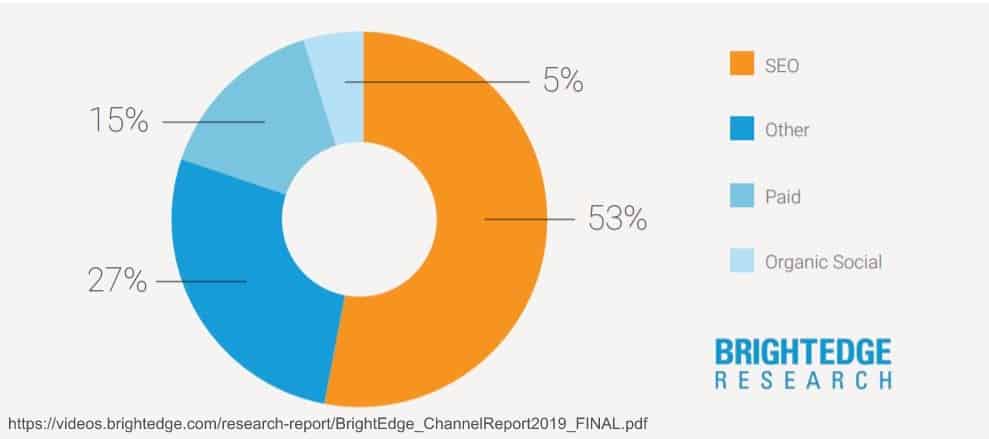
If you want website traffic, showing up in search results is going to help! That’s why SEO matters.
It’s also why today we’re digging into a core concept for effective SEO – domain authority.
The what. The how. Ways to increase your domain authority. And most importantly, ways to use the amount of domain authority you have now effectively, so you can get results from your SEO and content strategy more quickly.
Let’s start at the beginning.
What is Domain Authority?
The simple version – Domain Authority is a score between 1 and 100, of how ‘good’ your website is. The higher the score, the more likely you are to appear high in search results.
Of course your website still has to be relevant to the specific search. An architect’s website won’t show up when I search for ‘grandparents and family law’, and a family law site won’t show up when I search for ‘can I add a second storey to my home’.
In many ways, domain authority is like an ATAR, or Australian Tertiary Admissions Rank.
- Domain authority compares websites which cover different topics. ATAR compares students who study different subjects.
- Domain authority alone doesn’t get you into all search results. ATAR alone doesn’t get you into all universities. You might also need relevant subjects. Or maybe you have to pass an interview or meet other criteria.
- The domain authority you need to show up for different search queries varies. The ATAR you need to get into different universities varies.
In both cases, there is variation even for the same subject.
What matters most is your ranking relative to other sites you are competing with to show up in search results.
How is Domain Authority calculated?
Let’s start with the bad news.
First off, there’s more than one version of ‘domain authority’, although for this article we’ll concentrate on the best known. That’s administered by Moz, one of the oldest SEO companies. Secondly, Moz and the other companies who rate domains (Ahrefs, SEMRush, probably others) keep their algorithms very secret indeed! So no one knows the detail.
The good news is, the detail doesn’t really matter, and the general principles are clear. Whether we’re talking about a website or a person, authority comes from two main things:
- how well you present yourself to fit your role
- what respect others give you

In website terms, that is:
- How well your website presents. Note this doesn’t just mean a pretty design. It means technical performance like load speed, mobile friendliness and site structure. It means quality content – where you can tell what each page is about. Regularly updated content. Good website hygiene – no broken links.
- How other websites and users treat your website. Every time another site links to you, that’s a vote for your authority. The more authority that site has, the better for you. (It’s good to get an article in your local newspaper, but it’s much better to appear on national TV.) There are even cases when a link might hurt you. (What if a known Mafia boss says you’re the lawyer he trusts above all others?)
In other words, on-page SEO and off-page SEO!
What’s a good Domain Authority?
Simple answer – a good domain authority is one that is better than your competition. Remember that domain authority is not a mark, it’s a comparison. You don’t need to hit a particular score, you just need to be ahead.
Seopressor say that ‘Domain authority between 40 and 50 is considered average, between 50 and 60 is considered good and over 60 is considered excellent’.
But this assumes that you are competing on at least an American if not a global scale. Google.com has a domain authority of 100, but google.com.au only scores 92.
It also helps to be a consumer brand. Westfield.com.au has a domain authority of 61 – their parent Scentre Group scores only 45.
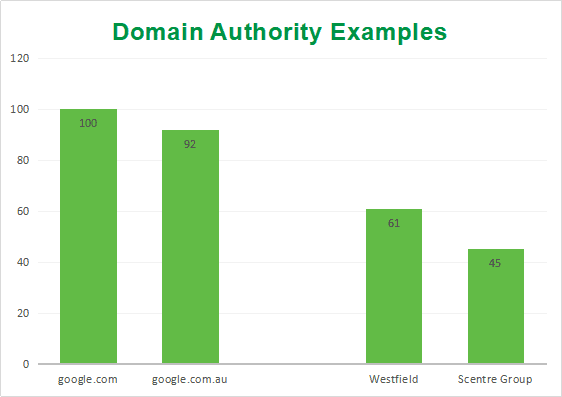
If you’re a small local business in Australia, you’re much more likely to be somewhere between 5 and 25. For a new business, expect a ranking of 1 or 2. On the plus side, the scale is logarithmic, so for new businesses it’s much easier to improve your domain authority.
So how do you find out what your Domain Authority is?
A really simple way to start is by using the Small SEO Tools Domain Authority Checker. This is free for anyone and allows you to check up to 10 domains at once. So you can see how you compare to your competition!
The Moz SEO toolbar
Moz also have a handy little extension for Chrome and Mozilla Firefox – the Moz seo toolbar. It’s a more serious tool and you will need a Moz Community account to use it. There are three main ways you can use it
The full toolbar shows not only domain authority but also some other useful SEO info. Click on the magnifying glass bottom left for yet more.

If you just want to know about domain authority, switch to ‘DA mode’. You’ll find the info at the top right of your screen with your other browser extensions.

Finally, you can use the Moz toolbar to see the domain authority on Google search results. This is super handy for checking out options to optimise your web pages, which is what we’ll look at next.
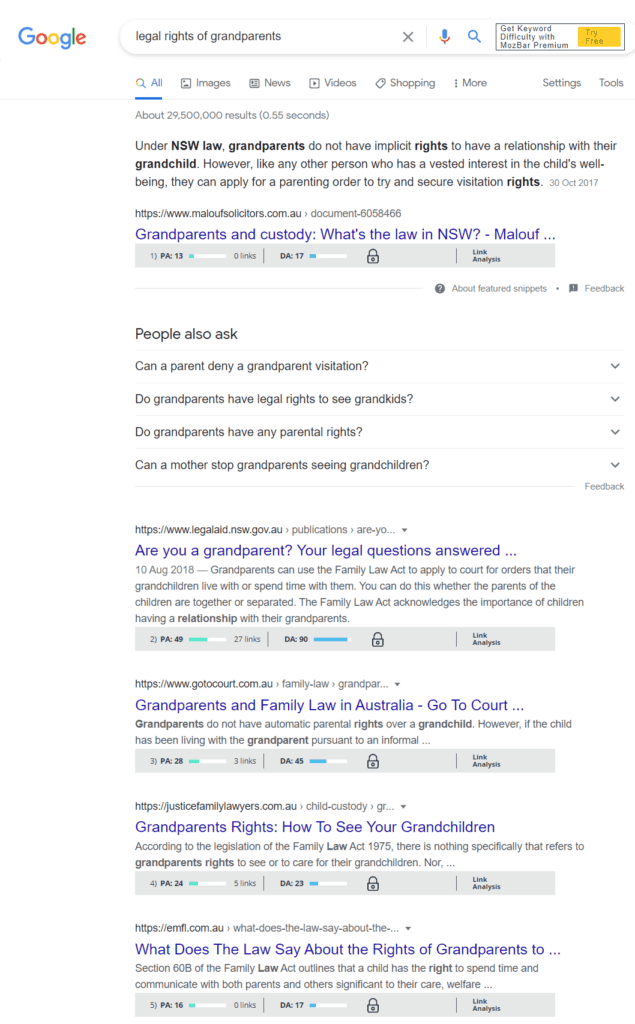
Using Domain Authority to improve your online results
Remember we compared Domain Authority to an ATAR? Let’s take that a bit further.
Law is a popular subject. To study law at the top universities, you’re probably going to need an ATAR in the high 90s. But there are other universities where the competition is less fierce.

You can use this information to help you decide which university to target – based on your expected ATAR.
In exactly the same way, the domain authority you need to show up for different search terms is different.
Imagine you’re a family lawyer, writing a blog article about grandparents’ rights. There are various different terms you could focus on as your main keyword. Here are some ideas:
- grandparents and family law
- grandparents rights in family law
- what legal rights do grandparents have?
- legal rights of grandparents
How do you decide which one to use? Start with some criteria:
- good search volume
- easy to rank for
- easy to write into your content without it feeling forced
Now we can go to a number of tools to assess search volume. I usually start with Ahrefs, but in this case the topice was too niche and they didn’t have data for Australia. So I went to the Google Keyword Planner:
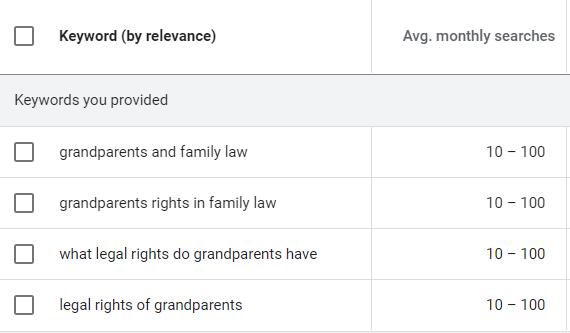
There’s no clear difference in search volume, but will it be easier to rank on page one for some keywords? I checked out the domain authority of current search results.
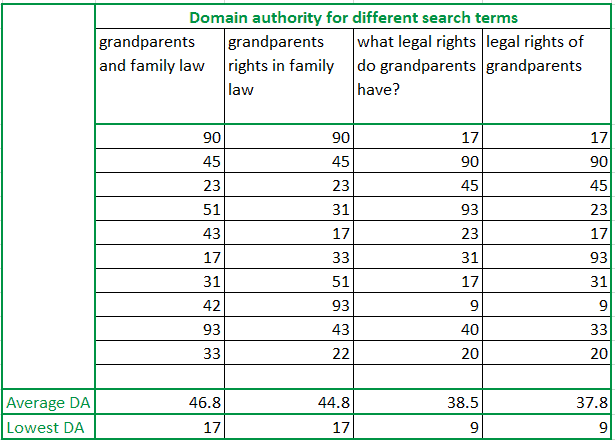
There’s less competition for ‘legal rights’ than for ‘family law’, but not much difference between the two variations using this term. So I look at the last question. It’ll be much easier to use the phrase ‘legal rights of grandparents’ a few times rather than keep asking the same question. So that’s my primary keyword (phrase) to optimise for.
Remember to balance ease of ranking and search volume
You can use this same process for new content and for reviewing existing content. The aim is to have as many pages as possible appearing on page one of search results, for as many searches as possible.
If you pick very broad topics, you may find there are no suitable keywords where you can rank on page one.
For example, if you search for ‘content marketing’, every result on page one has a domain authority of 70 or more. NoBull Marketing, with a DA of 16, isn’t going to show up. That leaves two options:
- Publish and be damned!
Because this is a topic you care about and you believe your readers care about. So you’re going to get the traffic some other way apart from search – by email, or by links from another page on your site which does show up, or by paid advertising. - Consider niching down.
Content marketing for lawyers. 5 quick content marketing wins. The difference between content marketing and SEO.
The audience will probably be smaller, but at least you stand a chance of reaching it.
Remember, it’s better to rank on page one for 50 searches than to rank on page two for 500 searches!
How do you increase your Domain Authority?
Improving your domain authority is really simple in principle.
It comes back to those core factors in SEO:
- Technical factors like site speed, mobile friendliness and site structure
- Quality content. That means one topic per page, well organised so that Google can understand it. Proper use of headings. Alt text so that Google understands what your images are and how they’re relevant.
- Rich content. A site with more pages and posts has more information to share. It’s even better if that information is focused on one or two main suject areas.
- Measures of external approval. Links from other sites, especially quality sites. Social shares.
The principles are simple. But like most things worth doing, it takes work!
You can do that, or if you’d like some help, let us know.






